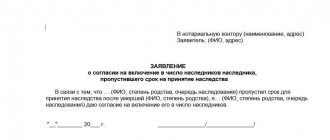From the moment of death of a relative (close or distant), a period of 6 months when you can claim the inheritance of the deceased. To do this, you just need to contact a notary. You can open an inheritance case with him by declaring your inheritance claims and submitting the necessary documents. Or join an existing business as the next successor by writing an application for inheritance.
If the heir does not appear at the notary's office within six months, but applies later, he will be refused to accept such an application. However, if the deadline was missed for a good reason, the law protects the rights of citizens and gives them the opportunity to try to claim their rights. There are a number of other situations where a missed deadline will not be a serious obstacle to receiving valuables from the testator.
The article talks about such details. If you have any questions, ask in the comments.
Deadline for entering into inheritance according to law and will
Compliance with the 6-month period is necessary for both methods of inheritance:
- in a will;
- in law.
For all heirs, regardless of the basis (by law or will), there is an opportunity to restore the missed period.
Should I go to court or not?
What to do if you did not meet the time frame and the deadline for entering into an inheritance has been missed? The issue can be resolved in 2 ways:
- without trial. Then you need written consent from all other heirs who accepted the inheritance (extremely rarely feasible);
- in a court. When the problem cannot be resolved out of court: if there is an objection from at least one of the heirs;
- for the only heir who missed the deadline;
- all available heirs missed the deadline.
Out-of-court procedure for reinstatement
To do this you need:
- Obtain consent
Ask all heirs (who have entered into the case) to express their consent in writing to the redistribution of shares or payment of monetary compensation (if the property has been sold by that time). Consent can be obtained either separately from each heir or from all of them at once on one sheet of paper (agreement). The agreement outlines the resolution of all issues regarding compensation for damage to the “latecomer”. But the rights of incapacitated and minor heirs should not be infringed. Written consent, requested and received in any way, is certified by a notary in the presence of all heirs.
The notary must explain to all other heirs that if they agree, they will have to “share” their share. Since the shares will be redistributed taking into account the late applicant. Moreover, someone may lose their right. For example, I entered into an inheritance according to the law, but there was a will for the only “late” heir. Heirs who entered earlier are not obliged to explain to anyone the reasons for their disagreement or agreement to restore the term for the “latecomer”.
If one of the heirs entered is a child or incapacitated, then such consent is given under the control of the guardianship authority (permission for such consent is issued).
- Obtain a certificate of acceptance of inheritance from a notary
After signing all consents (or a general agreement), a certificate of acceptance of the inheritance is issued to the person who missed the deadline in the part that would have been due to him by law or by will.
By will or by law
Entering into inheritance under a will - the testator does not always inform about the preparation of a will. Sometimes the presence of this document comes as a surprise to loved ones. It happens that not one, but several wills are drawn up, indicating several persons in them. In situations where you are one of the heirs specified in the will and are late in joining. Then the written consent of all actual successors is drawn up that they do not object to restoring you as an heir.
Entering into an inheritance by law - the algorithm for restoring the deadline for entering into an inheritance by law without a trial is the same.
Was a certificate of inheritance issued to the heirs?
- Certificates have already been issued - if all heirs agree and their signatures are properly witnessed, the notary will cancel the previously issued certificates of inheritance and issue new ones. Also, the heirs need to make changes to the state record. registration of real estate.
- The certificates have not yet been issued - issuance occurs upon applications of the heirs who accepted the inheritance, taking into account the share of the one whose right was restored out of court.
Issues regarding the transfer of compensation or property to him are resolved in accordance with Art. 1104, 1105, 1108 of the Civil Code of the Russian Federation or by agreement of the heirs, which is notarized.
When can the court refuse?
Insufficient evidence directly affects refusal decisions. Much also depends on such nuances as the view of the court staff, the nature of the opponent’s evidence base, the presence and level of protection on each side. For two identical cases, different results can be drawn based on the above reasons.
Nevertheless, the Russian Federation provides for a system for challenging such court decisions on restoring the period for entering into an inheritance. For this purpose there is an appeal, cassation, supervisory complaint. When a person is denied reinstatement of his sentence in the highest court, he may no longer hope to continue. Moreover, the entire process can last more than one year.
What to do if it is difficult to obtain the consent of the heirs?
If the latecomer has the right by will to a significant share in the estate
The difficulty is that if all the heirs have already exercised their right, except for the late one, who is indicated in the will and is actually the only heir. Consent will entail the loss or reduction of the shares of those heirs who are already using the property. For known reasons, the “latecomer” will be refused inclusion in the list of heirs. Such a refusal is handed over to the heir who missed the deadline by a notary, who draws up this document (in response to the application for entry). After the refusal, the late heir is free to go to court.
If the latecomer has an obligatory share in the inheritance
Also, refusal to obtain consent occurs when the heirs under the will have already assumed their rights. The statement about the missed deadline was drawn up by the one who claims the obligatory share (see who has the obligatory share in the inheritance).
For example , a disabled parent of the deceased who, despite the presence of a will, has rights to an obligatory share.
If the property due to the heir has not been preserved
Often a dispute may arise if the inherited property has been sold. Most disagreements between heirs arise precisely because of the sale of real estate. In this case, the process can be carried out until the due date is restored by another heir. In this situation, most judicial authorities oblige to pay financial compensation for real estate and things that were not preserved in kind. The amount due is calculated based on the cost of each specific item. In this case, the value of the indicator is calculated on the date of inheritance. Compensation is required to be paid by persons who originally received rights to property through inheritance.
Judicial procedure for restoring the right to accept inheritance
What to do if the deadline for entering into inheritance has been missed and consent has not been received from the heirs?
In order for the deadline to be restored in court, documents are needed confirming that the pass is valid. And also draw up a statement of claim.
It must reflect all known heirs (they will be defendants). Give the reason why the deadline was missed. According to territoriality, the court can be selected based on the last place of residence of any of those who have already entered into an inheritance (an alternative could be the place where the inheritance was opened).
If the inheritance was transferred to the state and there was a single heir under the will (who missed the deadline), the municipal body will be the defendant.
Sample statement of claim to court
The application is drawn up taking into account the general rules for conducting claim proceedings:
To the district court of ___________
Plaintiff: Details of the heir who wishes to accept the inheritance after 6 months
Defendant(s): Details of the heir(s) who have already entered into the inheritance
STATEMENT OF CLAIM
on restoration of the period for accepting inheritance
01/01/2021 Lidiya Ivanovna Ivanova, born in 1945, my mother, died. I am the heir of the first priority by force of law (or by will), but within the period established by law I did not contact the notary for the reason (specify what____________). The inheritance mass includes: ______________________________ (list of property). As a result of contacting a notary, I was refused in writing to accept my inheritance, since more than 6 months had already passed since the date of death. (Explain briefly who has already exercised their right to inheritance and other important points). Guided by the norms of Article 1155 of the Civil Code of the Russian Federation,
ASK:
To restore the period for entering into inheritance in connection with the death of Lidia Ivanovna Ivanova, consider the day _________ as the starting date of the period.
Application:
- receipt for sending the claim to the defendant (copy);
- death certificate (copy);
- birth certificate (copy);
- written notarial refusal (copy);
- Receipt for payment of state duty 300 rubles. If there are additional requirements, for example, simultaneous acceptance of inherited property, then the fee will be calculated based on the value of the property claimed by the late heir.
Comments on the lawsuit
If the court recognizes the reasons why the deadline was missed as worthy of attention, then the claim is granted. In its decision, the court is obliged to indicate the size of the share that is due to each of the real heirs, including the plaintiff. Additionally, there is no need to contact the notary with an application to issue a direct certificate of inheritance.
When a positive decision is made by the court, but the inherited property has already been sold by the “then” heirs, the court awards the plaintiff an amount of money equal to his share. Collection is made from all heirs in favor of the plaintiff.
Sometimes heirs file an application only to restore the term. The further fate of the division of the inheritance after the restoration of the term is decided by the notary. Which type of application to choose depends on the individual case. It is more convenient to immediately restore the term and redistribute the inheritance in court. This saves a lot of time, effort and money.
Common reasons for missing a deadline and how to avoid it
The heir did not know about the death of a relative or did not have information about the deceased’s property
When there are few relatives and they all live in the same city, it is difficult to imagine the situation if you did not find out about the death of one of them.
If none of your loved ones informed you, as a possible heir, that the testator was declared dead by the court, then you missed the deadline for entering into the inheritance for a good reason; it is possible to restore it.
If you were not informed about the death of an uncle, cousin or second cousin. You found out about this two or three months later due to living in another region (city, country), you must:
- Contact the notary who served the area where the deceased lived.
- Leave your details and address. You can be sure that if the inheritance procedure is formalized (by will or by law - there is no difference in this situation), you will be informed.
- If you subsequently receive a notification that you have been included in the will or that you are an heir in a certain line, you must declare in writing your desire to exercise this right. Otherwise, after six months from the date of death, you will be deprived of this opportunity.
But what if the place of residence of the deceased is unknown, but his death is reliably known?
It is necessary to find out the location of his most valuable property. This situation is very difficult and the measures taken to find the hereditary mass do not always lead to a positive result. Therefore, if the deadline for entering into an inheritance is missed due to the lack of any information about the place of residence or location of the deceased, there are all the prerequisites for its restoration.
What happens if you miss the deadline?
After the death of a citizen, his property is transferred to his heirs.
The period when citizens can declare a desire to accept the values of the deceased is reflected in Article 1154 of the Civil Code of the Russian Federation. This must be done within:
- six months if the primary heir applies (from the day of the citizen’s death);
- six months from the date of refusal of the heirs under the will or law, as well as the invalidation of the will;
- 3 months after the expiration of the general period for heirs who are not previously called.
The inheritance is accepted through a notary or in fact. If the application deadlines are missed, they will need to be restored. How to extend the established period in court and out of court is indicated in Article 1155 of the Civil Code of the Russian Federation.
In what cases are the reasons for missing a deadline valid?
There is no exact list of grounds on which an application for restoration of a missed deadline must be satisfied. The most common reason for the lack of a timely declared desire to accept the due inheritance within the required six months is the lack of opportunity to have information about the death of a relative , and sometimes about the availability of property.
The plaintiff did not know that the testator had died
The indisputable basis for the court to make a positive decision is strong evidence that the plaintiff did not know and could not know about the death or inheritance:
- did not communicate with relatives for a long time;
- did not know that they existed at all;
- believed that there was no inheritance;
- Lack of information about the place of residence of the testator may also lead to ignorance about his death, the existence of an inheritance and the possibility of accepting it.
If a relative goes missing
A valid reason for restoring the missed deadline may also be the lack of information from the potential heir about the recognition of the person as deceased.
Example: if a relative has been missing for a long time and no one has known anything about him for more than 5 (five) years. And also the circumstances under which he disappeared can be considered life-threatening (natural disaster, major accidents). The court, upon the application of a close person, may declare him dead. The consequences of the distribution of the inheritance will be the same as in case of ordinary death.
Often relatives are not aware of the court decision to recognize the deceased. This circumstance is almost always considered convincing for reinstating the six-month period.
Other reasons for absence that are considered valid
- treatment with a serious diagnosis, in a coma, without the ability to move, with a doctor’s recommendation that it is undesirable to participate in legal processes related to death (sometimes this occurs, especially in cases of severe shock and the danger of a stroke or heart attack);
- staying in another country when it is impossible to leave (failure to issue a visa, deportation from Russia);
- serving in places of deprivation of liberty without the opportunity to invite a notary (sometimes this possibility is provided for by the rules of the correctional institution).
In each case, the court will decide the fate of the claim on an individual basis, taking into account the specific circumstances.
When they refuse to reinstate the deadline
There is no evidence of impossibility of claiming inheritance
The most common grounds for refusal to satisfy claims:
- there is no argument that it was realistically impossible to assert a right to the property of the deceased;
- the heir knew about the inheritance, at first he did not want to enter (he did not participate in the preparation of documents, he even wrote an official refusal of the inheritance), but then he changed his mind.
In such circumstances, it is problematic to restore the term in court. When other relatives do not agree in writing to accept the “latecomer” into their ranks, the right to inheritance will be lost.
If 6 months have passed since the day the heir learned about the inheritance
If the application for restoration was sent to the court 6 months after the day when the valid reason ceased to be relevant, the period will not be restored. Conventionally, the period of 6 months for exercising one’s right as an heir is considered to begin from the day he learned about it.
For example , if the potential heir was employed abroad and therefore did not know about the day when the inheritance was opened (that is, the date of death of the testator). But after a certain time he returned to Russia, learned about the fact of death, and for six months after that he did not apply to the notary with the intention of accepting the inheritance.
When you are denied reinstatement of your deadline, you can file an APPEAL. In it, give your reasons and arguments about the validity of the reason. The appeal procedure for considering such cases is similar to the ordinary consideration of the case. In the second instance, the rules of claim proceedings are applied.
Possible reasons and consequences of refusal of a claim
If the court does not consider the reasons cited by the applicant to be compelling, his demands will not be satisfied.
The claim will also be rejected if you apply to the judicial authorities after six months have passed from the moment when the factors that prevented you from contacting a notary have been eliminated.
The decision will be negative if the applicant knew about the inheritance, but did not consciously register it, or announced his refusal and then changed his mind.
In case of refusal, the right to property is lost.
Exceptions for those who actually inherited
The courts have an ambiguous practice of restoring a missed deadline for accepting an inheritance when the heir is already using the property of the deceased. For example, he lives in his apartment. It is believed that if the inheritance has actually been accepted and the six-month period has long expired, there is no need to restore it.
In this case, the best way to secure hereditary succession would be to apply to the district court to certify the fact of acceptance of the inheritance. In this case, a strong confirmation of the real entry into the inheritance can be:
- securing payments on various loans of the deceased;
- care and care of pets;
- payment for housing and communal services;
- farm management measures.
Example : Grandfather died. The grandson who lived with him remained to live in his house; no more heirs were announced. The grandson did not apply to the notary to enter into the inheritance and did not formalize it. A year later, the need arose to sell the house. Reinstate the deadline on what basis? The grandson, naturally, knew that his grandfather had died, but here he actually entered into an inheritance; the court simply certifies this fact. In a situation where there are other heirs, again the court will sort out whether they missed the deadline for good reasons, but they do not have the actual acceptance of the inheritance, like a grandson.
If the heir used valuable items, but at the same time did not fulfill debt obligations, he will be denied acceptance of the inheritance (on the basis of its actual acceptance), since the selectivity of objects in the actually accepted inheritance contradicts the norms of inheritance law.
- Civil Code of the Russian Federation Article 1154. Deadline for accepting an inheritance
- Civil Code of the Russian Federation Article 1152. Acceptance of inheritance
- Civil Code of the Russian Federation Article 1155. Acceptance of inheritance after the expiration of the established period
- Civil Code of the Russian Federation Article 1163. Deadlines for issuing a certificate of the right to inheritance
Confirm your relationship or show a will
First, it is important to know that you can inherit any property if your name is included in the will of the deceased. If there is no will, then you can claim the inheritance on the basis of relationship with the testator.
To receive an inheritance under a will, you must visit any notary who works at the place of residence of the deceased. You need to bring the following documents with you: your passport, a will with a note from the notary who executed it that it was not changed or cancelled, as well as an archival certificate for F-9 from the passport office about the last place of registration of the testator. Based on these documents, the notary will open an inheritance case and tell you what other documents are needed to formalize the inheritance.
You may be interested in: Lawyer services for inheritance disputes.





